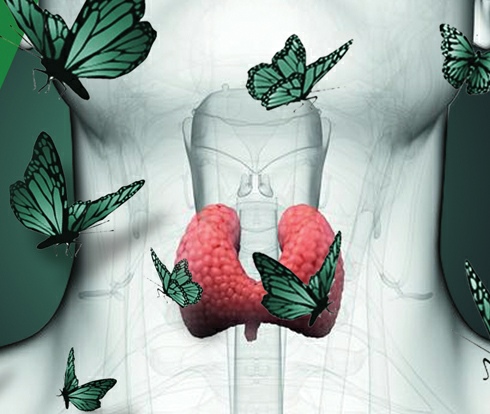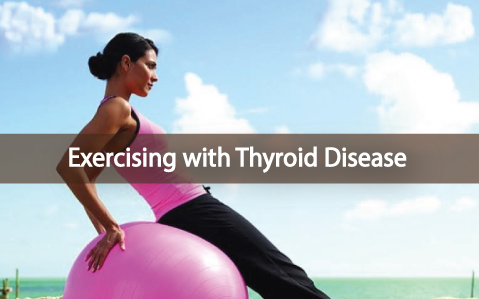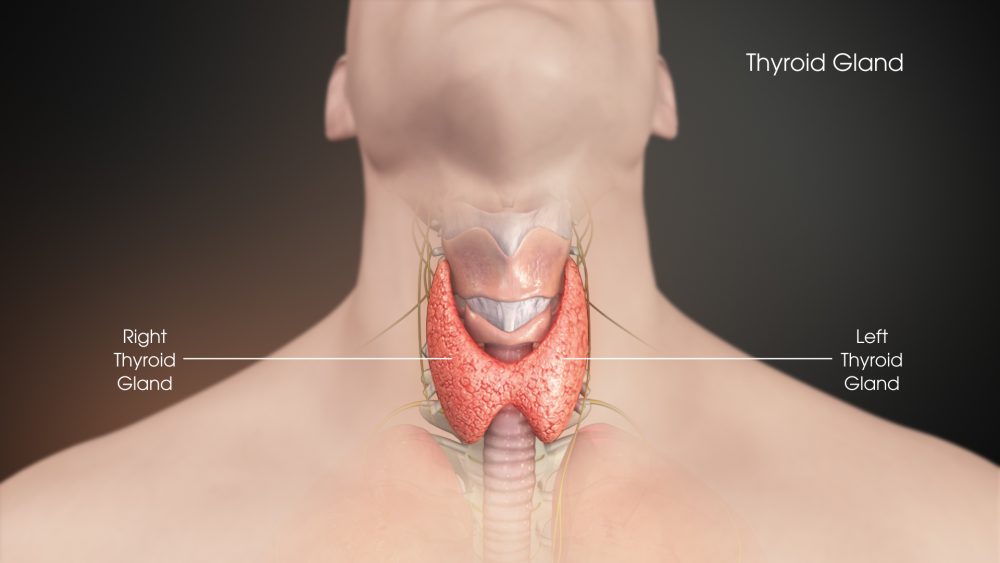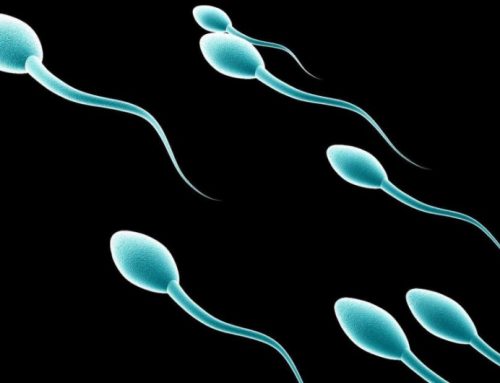Today’s article helps us understand the thyroid gland, its function in organism and problems presented.
We also check how thyroid problems and their extent affect (positively or negatively) the symptoms due to the disease.
It is important to have a good knowledge of our body and its function, so we can offer better care and protection from undesired situations.
Within this context, here we present an example of a gland, though very small, however extremely important for its smooth operation.
The thyroid gland – as seen later in detail – has a “regulatory” role in our body, determining the general function of our body.
Below we examine the meaning of the so-called body “regulator” and the exact function of the thyroid gland.
Thyroid Gland: Operation Nature and Utility
The thyroid gland relates directly to production of hormones in our body and therefore to body weight and metabolic rate.
It is a very small gland (only about 20 grams), one of the most important endocrine glands in body, located in the cervical region and consisting of 2 parts, taking over the production of important hormones for the body, such as calcitonin, thyroxine and triiodothyronine.

These hormones – also known as thyroid hormones – play a very important role, determining development from infancy to adulthood.
Thyroid Gland – Diseases
The general and specific importance on child’s physical and mental development already emphasized.
Let’s see what would have happened if an infant’s thyroid gland was problematic.
Here we have to mention that an infant born with a reduced production of these very important hormones in its body (thyroid hormones), is very likely to show problematic physical and mental development (known as cretinism).
Therefore, a problem of the thyroid gland would have a direct impact on the production of these hormones and therefore on the child’s general development and its later life and ability (physical & mental).
Any thyroid disease, usually treated by doctors with medication, followed for life in most cases. The treating physician evaluates each case, suggesting the most appropriate medication regimen to balance the function of this important gland.
Here is a list of the most important thyroid diseases:
- hypothyroidism
- hyperthyroidism
- thyroid cancer
- thyroiditis
- goiter
- and nodules in the thyroid gland
Thyroid Disease – How diagnosed

The diagnosis of a thyroid disease requires examination by an endocrinologist, usually including blood tests and an ultrasound.
Depending on the exams outcome, the treating physician decides on the treatment course.
For example, in the case of a thyroid nodule, further testing is required to find a possible malignancy (cancer).
ATTENTION: Diagnosis is ONLY possible after relevant examinations and tests by a specialized endocrinologist (not by any physician).
The doctor requires information on patient’s history and following evaluation of medical examinations, decides on the problem and its treatment.
A thyroid treatment has no specific duration, as defined by the type of problem arisen, the patient’s general health condition, its history and symptoms he presented.
Usually – as already mentioned – the treatment for hypothyroidism (reduced production of thyroid hormones) is lifelong, aiming at balancing the gland for proper production of hormones in the body.
In case the problem is due to an autoimmune condition of the organism (hyperthyroidism due to autoimmune disease), the medication usually recommended goes for 1-2 years, following the patient’s re-evaluation and treatment redefined.
Thyroid Function – How affected
Our daily routine and certain habits could greatly affect the thyroid gland function, might leading to problematic performance in long term.
A number of everyday life’s important points requiring attention are shown below:
- insufficient sleep (or poor sleep)
- unhealthy food
- intense & constant stress
- the use of chemicals in everyday life
- extreme & hard diets
- abuses
Probably you noticed that the above conditions often affect your body weight, something related to thyroid gland and the metabolic function of organism.
Therefore, a proper diet, regular physical activity (enhancing the physical, mental and spiritual health of individual), a regular rest / sleep program and certainly the effort to eliminate stress from everyday life (in few words getting rid of the toxic side of our modern life) can enhance good functioning of the gland and promote a healthy body weight.
A “Butterfly” affecting Metabolism

The thyroid gland is a gland consisting of two identical parts, one connected to other, as a reflection of each other, forming a butterfly.
Therefore, this butterfly affects the metabolic rate of organism in adults, determining its function. The internal body’s temperature and its maintenance at normal levels, for example, is the “job” of this butterfly-shaped gland at the base of our neck.
This small gland, located in front of trachea, below the larynx, undertakes to produce hormones ultimately determining metabolic function.
The thyroid gland uses iodine obtained via diet to produce these hormones.
As understood, diet plays a decisive factor in the final function of thyroid gland, determining its effectiveness.
TIP: A proper & balanced diet – an important point requiring attention by all – is imperative, not only as a means of dealing with thyroid problems but as a means of preventing each problem and promoting its proper functioning, as well.
WHY THYROID IS IMPORTANT: The proper and adequate functioning of thyroid gland also helps on controlling bad cholesterol in organism, as well as regulation of lipids.
Hypo and Hyper Thyroidism | What they Are and What I should Know
HYPO- and HYPER- thyroidism, are the two main thyroid diseases, you may have heard of.
Both conditions refer to thyroid dysfunction in diametrically opposite way.
On one hand, HYPO -thyroidism refers to a reduced production of thyroid hormones while HYPER -thyroidism refers to an increase in more than normal production of these hormones.
More specifically, in HYPO-thyroidism there is usually an unusual drop in the hormone T4 and a characteristic slowing of metabolic rate.
The person may also experience symptoms such as severe swelling of limbs and face, as well as swelling around the eyes. Also often reported are symptoms such as severe weakness and fatigue felt by the person, constipation, pale skin, depression, unnecessary weight gain, severe muscle pain, joint pain, decreased sense of taste & smell, menstrual problems (in women) and in some cases even slow speech.
HYPO-thyroidism often referred to as Hashimoto’s thyroiditis, a treatable disease fully viable by proper medication.
On the contrary, in hyper-thyroidism, thyroid hormones produced in excess, result in the release of excessive TSH, practically meaning increased energy levels, great difficulty sleeping, gastrointestinal abnormalities (usually diarrhea), increased anxiety, nervousness, intense fatigue, increased sweating, menstrual irregularities or a complete lack of it (for women), increased appetite levels, of the intestine, intense itching, tendency to vomit and nausea and surely intense hot flashes.
Thyroid and Physical Exercise

A person’s metabolism and body weight directly relate to its diet and the function of its thyroid gland.
Therefore, in case of thyroid dysfunction – no matter of the hard work in gym – it will be impossible to control your metabolic functions, body weight and fat stored in the body.
In HYPO-thyroidism the lack of energy and intense feeling of fatigue felt by patient often, prevent any form of exercise, leading to even greater weight control problems.
Muscle & joint pain is another topic under discussion for people suffering from HYPO-thyroidism, a major problem during exercise and especially in bodybuilding with a multiple strain.
Furthermore, in the case of hyper-thyroidism the person may have difficulty (especially in cardio training) due to excessively increased heart rate (tending to appear even in a state of complete calm).
Hyper-thyroidism also creates significant problems due to poor sleep and its impact on a person’s physical strength.
Foods promoting Good Function of Thyroid Gland
Below is a list of certain foods promoting the proper functioning of thyroid gland (since as we have emphasized many times nutrition is extremely important for its proper functioning):
- salmon
- shellfish
- coconut oil
- liver
- Himalayan salt
- Brasil Nuts





